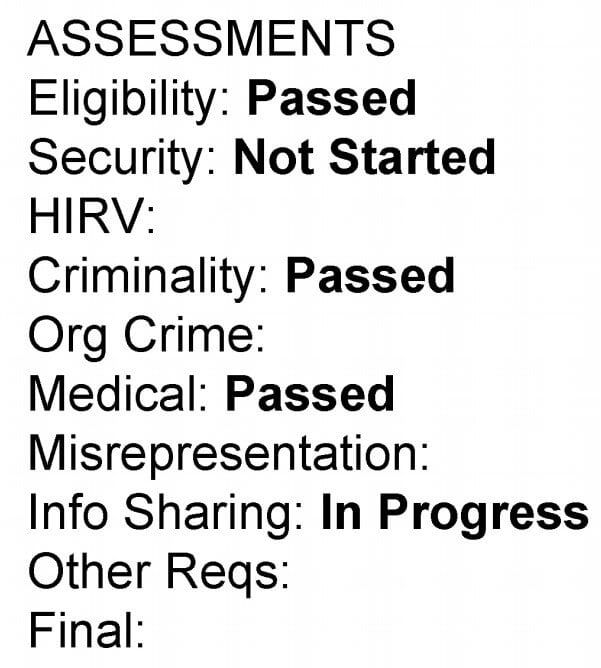Information (info) sharing, along with criminality check and security screening, is part of Background check (BGC). The purpose of info sharing is to combat international terrorism, war crimes, crimes against humanity and organized crime. As the name suggests, information is shared with Canada’s partner agencies and countries in the Five Eyes alliance. The Five Eyes is an intelligence alliance composed of Australia, Canada, New Zealand, the United Kingdom and the United States. These partner countries share a broad range of intelligence with one another in one of the world’s most unified multilateral arrangements. To read in detail about Canada’s agreement with each of the partner countries visit the official government of Canada website.
Does Info Sharing apply to all applicants?
Info sharing does NOT apply to all applicants. Usually, affected applicants are those who have previously applied (whether the visa was approved or not) with any of Canada’s partner countries in the Five Eyes intelligence alliance i.e. Australia, New Zealand, the United Kingdom and the United States.
What is the objective of Information Sharing?
The object of information-sharing is to support the effective administration and enforcement of Canada’s citizenship and immigration programs including, but not limited to, such matters as:
- travel to Canada, authorization to enter into Canada, the investigation of matters relating to program abuse, criminality, public safety and health, the coordination and streamlining of enforcement cases and the sharing of services and facilities, i.e., those used for detention purposes;
- the selection of foreign nationals, issuance of visas, protection of refugees, integration of newcomers, support of provincial and territorial immigration programs and settlement services;
- the support of Canada’s public safety and security objectives with respect to the management of the global movement of people and combating international terrorism, war crimes, crimes against humanity and organized crime.
When does Info Sharing happen in the application process?
Info sharing usually happens along with Criminality Checks early in the process. Criminality Checks consist mainly of examining the police certificate (PCC) from all countries where the applicant has lived for more than six months.
Where can one see the results of Info Sharing checks?
The results of Info Sharing checks can be easily seen in your GCMS notes. Your GCMS notes may look like the examples below; either In Progress or Complete. Once its Complete the results may be abbreviated as NRT which means No Reportable Trace or sometimes as NAI which means No Adverse Information. Both these are signs that the checks found no issues.
Sometimes an applicants may also see “Info Sharing: System Error“; all this means is that either no information was found or a technical error occurred in accessing the information. Associated with this you may also see the comments “Contact GCMS Helpdesk or Proceed with processing the application, at the VO’s discretion”. This is also a sign that the checks found no issues.
Some applicants may see this in their GCMS; Type: Biometric FCC – Additional Information. FCC refers to The Five Country Conference (FCC) which is a forum for co-operation on migration and border security, between the countries of Australia, Canada, New Zealand, United Kingdom, and the United States.


What information is shared?
Below is an example of an information sharing agreement between Canada and the United States;
Biographic Visa and Immigration Information Sharing with Canada
Under this program, DHS makes certain biographic information from its systems of records available to the Department of Citizenship and Immigration Canada (CIC) and the Canada Border Services Agency (CBSA) via query through the State Department’s Consular Lookout and Support System (CLASS). CIC and CBSA will use the information to assist in the administration and enforcement of Canada’s immigration laws. Similarly, CIC and CBSA will make certain biographic information from the Global Case Management System (GCMS), which is Canada’s system used to process applications for citizenship and immigration services, available to DHS via query through CLASS. DHS will use this information to assist in the administration and enforcement of the United States’ immigration laws. This Privacy Impact Assessment provides notice to the public regarding the information sharing and resulting privacy impacts of the Biographic Visa and Immigration Information Sharing program.
As another example of info sharing with Canada’s partner agencies; see CBSA-CISC Information Sharing Framework
Privacy protection and the Info Sharing process
The Government of Canada takes its privacy obligations very seriously, and has worked with the Office of the Privacy Commissioner of Canada to protect applicants’ personal information when collecting, using, and sharing biometric information.
When assessing your application, IRCC will share your fingerprints and photo with the Canada Border Services Agency (CBSA) and the Royal Canadian Mounted Police (RCMP). IRCC may also share it with other law enforcement agencies in Canada to enforce any Canadian or provincial law, as well as with Canadian government institutions or foreign governments according to Canada’s privacy laws.
Your fingerprints and photo will also be shared with the U.S., the United Kingdom (U.K.), Australia and New Zealand in a way that respects:
- privacy laws
- civil liberties
- human rights (including the Canadian Charter of Rights and Freedoms)
How your information is stored and transmitted
Your information is collected, stored and transmitted securely using encryption. This prevents unauthorized access to your information.
Biometrics collection service locations, such as VACs, ASCs and Service Canada locations, do not keep your information. Your information is deleted from the collection system once it’s sent to the Canadian Immigration Biometric Identification System.
Further reading
Information (info) sharing, along with criminality check and security screening, is part of Background check (BGC). Now read more about security screening at All about Security Screening and along with it also review CBSA’s online version of Security Screening Process Manual

